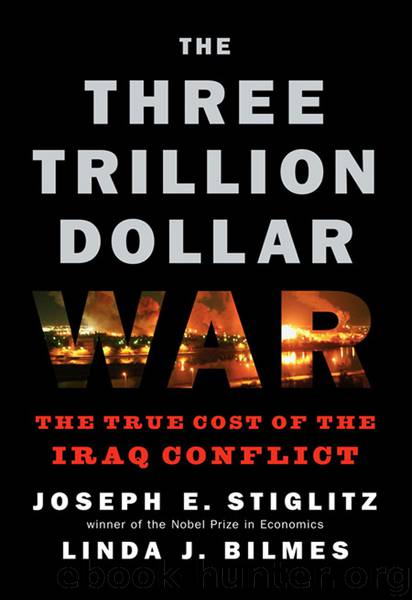The Three Trillion Dollar War by Linda J. Bilmes & Linda J. Bilmes

Author:Linda J. Bilmes & Linda J. Bilmes
Language: eng
Format: epub
Publisher: W. W. Norton & Company
Published: 2008-12-15T16:00:00+00:00
Global Peace and Security
THE DREAM OF the U.S. invaders was to create a stable, prosperous, and democratic Middle East. But America’s intervention in Iraq is laying the foundations for precisely the opposite result—and the consequences of America’s Iraqi venture for global peace and security extend beyond the Middle East. It has helped feed extremism throughout the Islamic world and beyond. This growth of extremism has made the task of leaders in moderate Islamic republics all the more difficult. They have been forceful in encouraging Bush to withdraw, knowing that if the war continues, they will face an increasingly hard time containing more fundamentalist forces.71
America’s standing in the world has never been lower. Anyone who has traveled abroad knows this. It is also confirmed by every poll and opinion survey. Of course, there have always been mixed feelings: envy mixed with admiration, respect for American democracy and its advocacy of human rights mixed with resentment toward its brashness and overconfidence. But the positives have outweighed the negatives in most countries. This was true not just of traditional allies, such as Great Britain (where 83 percent of the population had a favorable rating of the United States in 1999–2000) and Germany (78 percent), but even in Islamic countries, such as Indonesia (75 percent), Turkey (52 percent), and Morocco (77 percent). Franklin D. Roosevelt, John F. Kennedy, and Bill Clinton were global heroes, even more in some places abroad than they were at home. The war has dramatically changed this picture: compared to 2002, favorable ratings of America are now lower in twenty-six of thirty-three countries surveyed by the Pew Research Center.72 The situation has worsened in most Muslim countries in the Middle East and Asia—and even among historically steadfast U.S. allies.
By 2007, favorable ratings had fallen to 9 percent in Turkey and 29 percent in Indonesia.73 That same year, confidence in President Vladimir Putin’s leadership exceeded that of President Bush in Canada, Britain, Germany, and France. In chapter 1, we noted that citizens of many countries saw America in Iraq as a greater threat to global peace than Iran. More remarkably, another recent Pew Survey showed that in every country surveyed, the U.S. presence in Iraq was viewed as a greater threat to world peace than North Korea. In short, all over the world, the United States was viewed as a greater danger than the countries President Bush included in his “axis of evil.”74 In Indonesia, a moderate Islamic republic, 80 percent of the public reported being either “very” or “somewhat” worried about America as a military threat to their country. Indeed, a vast majority of those in Islamic countries—and a majority among many of our allies—believe that the Iraq war has made the world a more dangerous place. In Islamic countries, majorities (in some cases, large majorities) see America’s motives as dominating the world and gaining control of Middle East oil.75 Most disturbing is that America is no longer seen as a bastion of civil rights and democracy. The Iraq war “for democracy” has almost given democracy a bad name.
Download
This site does not store any files on its server. We only index and link to content provided by other sites. Please contact the content providers to delete copyright contents if any and email us, we'll remove relevant links or contents immediately.
The Secret History by Donna Tartt(16618)
The Social Justice Warrior Handbook by Lisa De Pasquale(11489)
Thirteen Reasons Why by Jay Asher(7786)
This Is How You Lose Her by Junot Diaz(5767)
Weapons of Math Destruction by Cathy O'Neil(5034)
Zero to One by Peter Thiel(4823)
The Myth of the Strong Leader by Archie Brown(4789)
Promise Me, Dad by Joe Biden(4444)
Stone's Rules by Roger Stone(4415)
Beartown by Fredrik Backman(4413)
How Democracies Die by Steven Levitsky & Daniel Ziblatt(4396)
The Fire Next Time by James Baldwin(4341)
100 Deadly Skills by Clint Emerson(4075)
A Higher Loyalty: Truth, Lies, and Leadership by James Comey(4031)
Rise and Kill First by Ronen Bergman(4012)
The David Icke Guide to the Global Conspiracy (and how to end it) by David Icke(3880)
The Farm by Tom Rob Smith(3871)
Secrecy World by Jake Bernstein(3782)
The Doomsday Machine by Daniel Ellsberg(3730)
